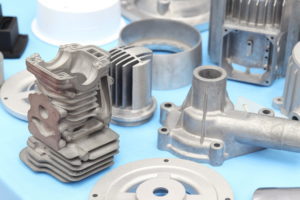The Only Guide to Alcast Company
Table of ContentsThe Ultimate Guide To Alcast CompanyThe 7-Second Trick For Alcast CompanySome Known Incorrect Statements About Alcast Company 6 Easy Facts About Alcast Company ExplainedThe Main Principles Of Alcast Company 7 Simple Techniques For Alcast Company
The subtle distinction hinges on the chemical content. Chemical Comparison of Cast Aluminum Alloys Silicon promotes castability by decreasing the alloy's melting temperature level and improving fluidity throughout spreading. It plays an important duty in permitting elaborate mold and mildews to be filled up accurately. Furthermore, silicon adds to the alloy's toughness and wear resistance, making it useful in applications where durability is crucial, such as vehicle components and engine elements.It also improves the machinability of the alloy, making it much easier to process right into finished items. In this method, iron adds to the overall workability of light weight aluminum alloys.
Manganese adds to the stamina of aluminum alloys and enhances workability (Foundry). It is commonly utilized in wrought aluminum products like sheets, extrusions, and accounts. The visibility of manganese aids in the alloy's formability and resistance to fracturing throughout fabrication procedures. Magnesium is a lightweight component that supplies strength and effect resistance to aluminum alloys.
Our Alcast Company Diaries
Zinc improves the castability of light weight aluminum alloys and helps control the solidification procedure throughout spreading. It improves the alloy's strength and hardness.

The main thermal conductivity, tensile strength, return stamina, and elongation differ. Amongst the above alloys, A356 has the highest thermal conductivity, and A380 and ADC12 have the most affordable.
Fascination About Alcast Company

In precision casting, 6063 is well-suited for applications where complex geometries and high-grade surface area finishes are vital. Instances include telecommunication units, where the alloy's remarkable formability permits streamlined and visually pleasing styles while maintaining structural integrity. Similarly, in the Illumination Solutions market, precision-cast 6063 components produce elegant and efficient lighting components that call for intricate forms and good thermal performance.
The A360 exhibits remarkable elongation, making it excellent for facility and thin-walled parts. In accuracy Clicking Here spreading applications, A360 is fit for industries such as Customer Electronic Devices, Telecommunication, and Power Devices.
Some Ideas on Alcast Company You Need To Know
Its one-of-a-kind properties make A360 an important option for precision spreading in these sectors, boosting product toughness and high quality. Light weight aluminum alloy 380, or A380, is an extensively used casting alloy with a number of distinct attributes. It offers superb castability, making it an ideal choice for accuracy spreading. A380 displays good fluidness when molten, making certain complex and thorough mold and mildews are precisely reproduced.
In precision spreading, light weight aluminum 413 beams in the Consumer Electronics and Power Tools industries. This alloy's premium deterioration resistance makes it an excellent selection for outdoor applications, making certain long-lasting, durable products in the discussed industries.
More About Alcast Company
The aluminum alloy you select will substantially influence both the casting process and the residential properties of the final product. Due to the fact that of this, you must make your decision carefully and take an enlightened strategy.
Establishing the most appropriate aluminum alloy for your application will certainly mean considering a wide array of features. The very first group addresses alloy features that impact the manufacturing process.
Some Ideas on Alcast Company You Need To Know
The alloy you select for die spreading straight affects several facets of the spreading procedure, like just how very easy the alloy is to collaborate with and if it is vulnerable to casting problems. Warm breaking, also referred to as solidification cracking, is a typical die spreading problem for aluminum alloys that can cause interior or surface-level rips or cracks.
Specific aluminum alloys are much more susceptible to warm breaking than others, and your selection ought to consider this. Another typical defect located in the die casting of aluminum is die soldering, which is when the actors sticks to the die wall surfaces and makes ejection tough. It can damage both the cast and the die, so you should seek alloys with high anti-soldering properties.
Rust resistance, which is already a notable characteristic of light weight aluminum, can vary significantly from alloy to alloy and is a crucial characteristic to consider depending upon the environmental problems your item will certainly be exposed to (Casting Foundry). Wear resistance is one more residential property generally sought in light weight aluminum items and can distinguish some alloys